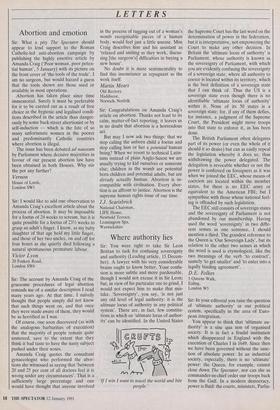Where authority lies
Sir: You were right to take Sir Leon Brittan to task for confusing sovereignty and authority (Leading article, 15 Decem- ber). A lawyer with his very considerable brains ought to know better. Your confu- sion is more subtle and more pardonable, though I would not excuse it in Sir Leon; but, in view of his particular axe to grind, I would not expect him to make that mis- take. 'Sovereignty', you say, 'is not just any old level of legal authority: it is the ultimate locus of authority in any political system'. There are, in fact, few constitu- tions in which an 'ultimate locus of author- ity' can be identified. In the United States 'If I win I want to travel the world and bite people.' the Supreme Court has the last word on the determination of power in the federation, but it is interpretative, not empowering the Court to make any other decision. In Britain the 'ultimate locus of authority' is Parliament, whose authority is known as the sovereignty of Parliament, with which you are evidently confusing the sovereignty of a sovereign state, where all authority to coerce is located within its territory, which is the best definition of a sovereign state that I can think of. Thus the US is a sovereign state even though there is no identifiable 'ultimate locus of authority' within it. None of its 50 states is a sovereign state; for, if any of them defies, for instance, a judgment of the Supreme Court, the President might move troops into that state to enforce it, as has been done.
The British Parliament often delegates part of its power (or even the whole of it should it so desire) but can as easily repeal the legislation whereby it does so, thus withdrawing the power delegated. The delegation is revocable whether or not the power is conferred on foreigners as it was when we joined the EEC, whose means of coercion are located within the member states, for there is no EEC army or equivalent to the American FBI; but I sympathise with those whose national feel- ing is offended by such legislation.
The EEC still consists of sovereign states and the sovereignty of Parliament is not abandoned by our membership. Having used the word `sovereignty' in two diffe- rent senses in one sentence, I should mention a third. The grandest reference to the Queen is 'Our Sovereign Lady', but its relation to the other two senses in which the word is used is etymological, like the two meanings of the verb 'to contract', namely 'to get smaller' and `to enter into a legally binding agreement'.
D.E. Folkes
5 Queens Walk, Ealing, London W5










































 Previous page
Previous page